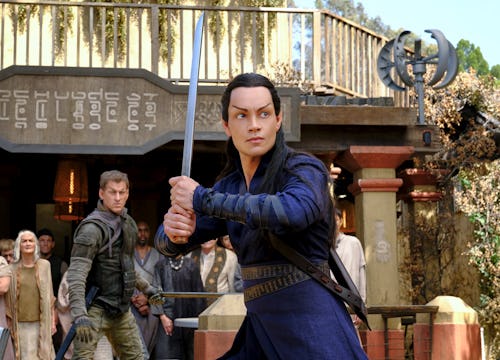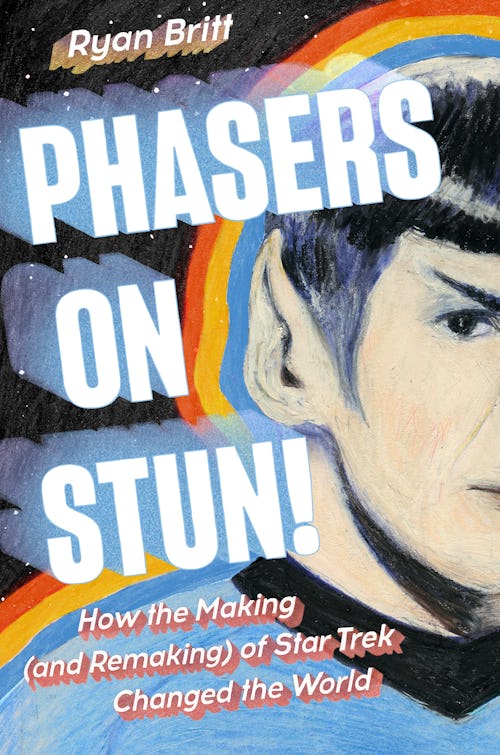
Among hardcore Trekkie circles, there are essentially two dominant opinions about the spinoff sequel series Star Trek: Picard: It didn’t get good until Season 3 in 2023, or the show abandoned its original premise almost immediately after Season 1 sacrificing its new characters in favor of nostalgia when Guinan (Whoopi Goldberg) and Q (John de Lancie) returned in Season 2, and then, the rest of the TNG cast in Season 3. Both viewpoints suggest that Picard is the most uneven of the new post-2017 crop of Star Trek shows, and in that specific assessment, there is certainly some truth. But, what these all-or-nothing takes leave out is the hardcore commitment to classic science fiction themes in Picard Season 1. And regardless of how you feel about the show’s first season, that specific batch of episodes consists of a return to deeply contemplative Star Trek.
Five years after Picard’s debut on January 23, 2020, the legacy of the show remains mixed. (See what I did there.) But what’s fascinating about this series is just how unique its first season remains, and how five years later, what seemed like Star Trek’s safest bet was actually a moment of radical experimentation. Here’s why Picard Season 1 mattered, and why it holds up much better than some of the haters might tell you.
Star Trek’s version of Logan
When Patrick Stewart stepped onto the stage of the annual Las Vegas Star Trek conventional on August 4, 2018 and revealed that he was returning to the character of Jean-Luc Picard nearly two decades after the release of the film Star Trek: Nemesis, it was a game-changer for the Trek world. At the time, of the various new Star Trek shows, only Discovery Season 1 had aired, with Short Treks airing just a few months later. So, at the time, fans weren’t even aware how much they would love Anson Mount as Captain Pike in Discovery Season 2, and the clamoring for a Captain Pike show (Strange New Worlds) wasn’t even a thing. For a hot second, a return to the era of The Next Generation, the objectively most popular iteration of Star Trek ever, was the safest bet possible.
But in 2020, Picard Season 1 positioned itself adamantly as not a sequel to The Next Generation, but instead, Jean-Luc Picard’s version of the X-Men film Logan. Not an action-packed series, the selling point of Picard was that it would be more contemplative, and realistic. To prove its own thesis, Jean-Luc doesn’t even leave the ground until after the third episode of Season 1. Instead, he putters around on Earth for three episodes, trying to solve the mystery of a recently murdered android named Dahj (Isa Briones), which leads to a complicated conspiracy involving the Romulans, the Borg, and a very ancient Dune-esque evil AI.
Along the way, Picard Season 1 gave Jean-Luc an entirely new gang of allies, including a depressed freelance starship captain Rios (Santiago Cabrera), a cynical former intelligence agent Raffi (Michelle Hurd), chipper roboticist Dr. Jurati (Alison Pill), Romulan warrior monk Elnor (Evan Evagora), and Star Trek: Voyager fan-favorite Seven of Nine (Jeri Ryan). And while Jonathan Frakes Marina Siritis, and Brent Spiner all reprised their Next Generation roles as Riker, Troi, and Data at certain points in the season, the vast majority of Picard Season 1 was, essentially, creating a new mythology for its titular grumpy, now-retired, Starfleet hero. If you’re among those who think only Season 3 of Picard is good, it’s important to remember that without Season 1’s new mythology for Jean-Luc, we would have never gotten there.
A Trek to Dune

While it is somewhat impossible to defend the circuitous and uneven mystery box plotting of Picard Season 1, it is easy to defend the excellent dialogue and overall deep-rooted science fiction themes. Recently, the HBO Max series Dune: Prophecy delivered a clunky look at how a religious caste might battle with advanced AI in the distant future. But, five years ago, Picard Season 1 did this much better than Prophecy, and even coded many of its players with Dune-like vibes. In short, if you’re looking for a Dune TV series that is better than Prophecy, look no further than Picard Season 1.
Consciously or not, showrunner (and noted novelist) Michael Chabon took the Romulan Empire and essentially turned it into a version of Dune’s Imperium but within the Star Trek mythos. Through Picard we got the Zhat Vash, an ancient Romulan cabal that has been long-dedicated to a holy battle against all artificial life, making them the Trek version of the Buterlians from Dune. On the other hand, Chabon also gave us the Bene Gesserit-esque matriarchal sect known as the Qowat Milat. Elnor, the sole male disciple of the Qowat Milat, was vaguely coded as Paul Atreides, albeit with much less main character energy. The Qowat Milat even gave Star Trek one of its coolest battle cries — when Elnor confronted his enemies with his Romulan sword, he issued them a warning: “Choose to live.” This meant, if you wanted to literally live long and prosper, then a peaceful withdrawal was the best option. But, if you chose death, then some Romulan badassery would commence.
Never before or since has a new Star Trek series created so much new continuity, much of which was instantly incorporated into Star Trek: Discovery Seasons 3 and 4, especially in regard to the Romulans in the distant future. But Picard Season 1 had one last gamble, a kind of Blade Runner twist that, on paper at least, was sheer brilliance.
Picard Goes Blade Runner

Since the 1960s series, Star Trek has had a twofold take on AI: Some AI is bad, and some AI is good, and even wonderful. Generally speaking, Trek dislikes big hivemind AI that flattens individuality and homogenizes culture. From super-computers masquerading as gods in The Original Series to the ChatGPT on steroids of the Borg in The Next Generation, Trek’s stance on AI is clear: If you start destroying individual thought, or create cultural laziness through automation, you’re committing a crime against humanity (and other sentient species, too.) In this way, it’s almost like Captain Kirk (William Shatner) was a part-time Dune-ish Butlerian in The Orignal Series; he loved unmasking supercomputers who were ruining entire planets.
But then again, Trek has also always had an affection for the type of AI that emerges as an individual being onto itself. In Star Trek: The Motion Picture, Spock (Leonard Nimoy) has sympathy for the AI thought cloud known as V’ger, and the ending of the movie becomes about teaching a sentient machine the value of tolerance and diverse thought. By 1987 and The Next Generation, Star Trek went full Isaac Asimov with the creation of Data (Brent Spiner), an android governed by a version of Asimov’s laws, all of which would prohibit Data from becoming one of those out-of-control AIs that Kirk hated. Just as Asimov’s robots had pushed back against Frankenstein's monster tropes in science fiction literature in the pulp era, Star Trek created sympathetic AI via Data and other characters in the ‘80s and ‘90s.
All of this made the conflict in Picard Season 1 somewhat... fascinating. It forced us to consider the concept of advanced AI as an overall culture, which meant there were forces for good and evil within that culture. When the crew of the La Sirena finds the hidden Sythn planet of Coppelius in the two-part season finale, “Et in Arcadia Ego, Part 1,” some of those artificial lifeforms are all about peace, and some were in favor of summoning even more ancient AI to destroy all organic life.
While the life-and-death stakes for the entire galaxy never quite felt convincing in the Picard Season 1 finale, the philosophical debate at the core of the series was crafted cleverly. Briefly, the Trek canon suggested that the Federation couldn’t have it both ways. After an uprising on Mars, the Federation banned all Synthetic lifeforms, which Picard sees as an overcorrection and true Dune Butlerians would see as common sense. But, Star Trek’s science fictional take on AI has never been strictly allegorical. Instead, the series treats Data and androids like him as individuals, in a way that is actually very hard to imagine. Yes, science fiction has been giving us robots with human personalities forever, but Data and his ilk are almost impossible to imagine in today’s AI climate.
So, in the end, Picard Season 1 made everything less about the ethics of hivemind, and more about how we actually define life. Without spoiling the exact ending of Picard Season 1, the show fundamentally changes the nature of Jean-Luc Picard himself, and thus, pushes the show into Philip K. Dick territory. Throughout Dick’s original novel — Do Androids Dream of Electric Sheep? — and the movie version, Blade Runner, the idea of humanity is questioned by the simple existence of Replicants. Over and over again, Blade Runner asks us the question: Does it matter how life was created? Isn’t it still life?
Picard Season 1 embraces this premise with zeal and philosophical commitment better than all of Westworld, most of Dune: Prophecy, and with slightly more nuance than Blade Runner: 2049. And, if for no other reason than that, this divisive Trek season deserves another look, or at the very least, your respect.
Star Trek: Picard is streaming on Paramount+.
FTTT

0 Comments